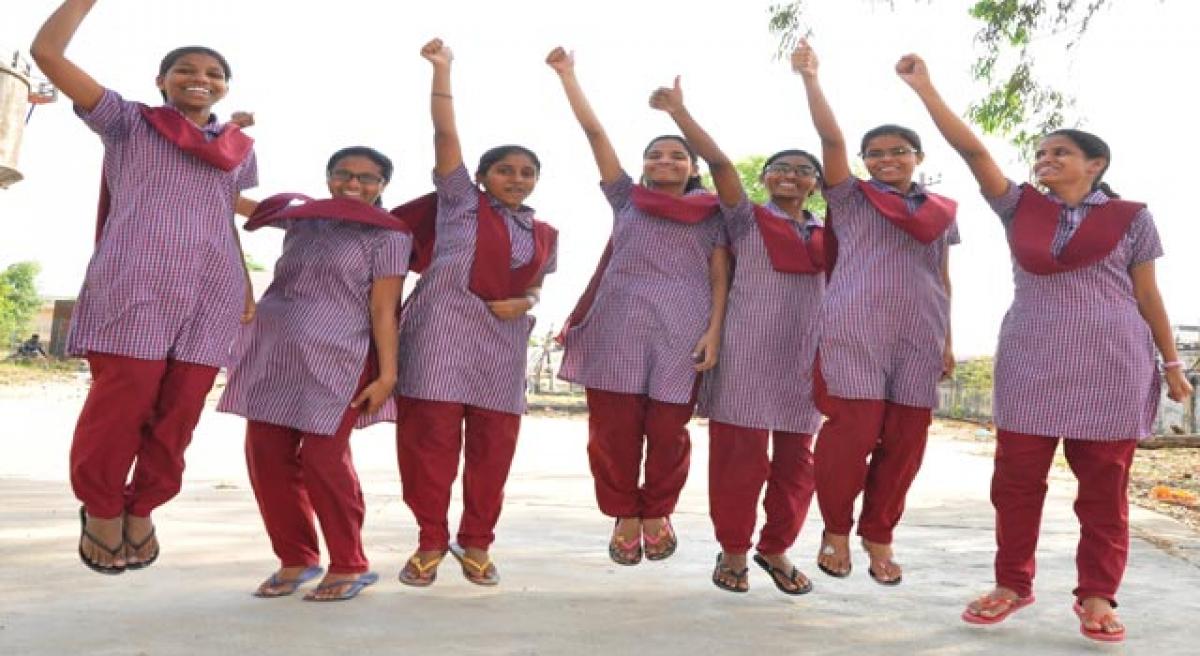Live
- VIP Treatment: Exclusive Benefits for High Rollers in Online Casino
- LS polls: Union Minister Bhagwanth Khuba, Dingaleshwara seer, Priyanka Jarkiholi file nominations in K'taka
- Amid show of strength, Congress’ Praniti Shinde files nomination from Solapur
- Tamil Nadu Police gives clean report to Isha Foundation in missing volunteers case
- Home Minister Amit Shah to address public meeting in Goa on April 24
- Gurgaon Open: M Dharma fires 67 for two-shot lead on penultimate day
- Sharad Pawar made many attempts to finish Shiv Sena, claims Maha minister
- Former England opener Raman Subba Row dies aged 92
- IPL 2024: Impact player rule is affecting the progress of half all-rounders, says Zaheer Khan
- ‘Teppa samudram’ review: Entertains with twists and turns
Just In
Residential colleges beat corporate colleges in Inter results


Beating the competition from corporate colleges, the government residential junior colleges have achieved better results in the Intermediate examinations whose results were announced on Sunday.
Hyderabad: Beating the competition from corporate colleges, the government residential junior colleges have achieved better results in the Intermediate examinations whose results were announced on Sunday.
Students of the government residential schools being run by the Telangana Residential Educational Institutions Society achieved top ranks. Ch Saicharan of TSR Junior College, Sarvail in Nalgonda district, got 990 out of 1000 marks and stood in the second position and B Pranitha of the TSR Junior College of Hasanparthy scored 982 marks and got 10th position in MPC in second year.
In BiPC Nipurai of TSR Jr College, Sarvail, secured fourth rank by getting 988 marks and Sonia of Hasanparthy college got 981 marks in second year. In first year Sarvail student D Akhil Kumar got 463, Pranay from the same institution scored 463 marks, L Bhavana of Hasanparthy got 463, and P Niharika of same institution got 463 marks and all these stood in the fifth position in the MPC group.
Similarly, a student of Hasanparthy college G Tulasi got 434 marks and got second position and Manijeet of Sarvail got fourth position with 489 marks. Secretary of TS Residential Educational Institutions Society B Seshu Kumari told The Hans India that their students have achieved overall pass percentage of 92.5 per cent in the exams. Out of the 438 students 405 have passed the second year exam.
As many as 23 colleges achieved 100 percent results and 31 institutions secured above 90 per cent pass percentage. Out of those passed 4,321 students secured ‘A’ grade. In the first year exams, the Telangana Social and Tribal Welfare Residential Educational Institutions Society students came out with flying colours.
They secured overall pass percentage of 76.03 as against the state average of 57 per cent in first year. Out of 9,196 students who appeared for the examination, 6,933 have passed. As many as 11 colleges secured 100 percent results and 21 institutions above 90 per cent. Out of those who passed 3,559 students secured ‘A’ grade.
Ruchitha of College of Excellence (COE) Karimnagar and Susmitha of IIT Gowlidoddi secured 974 marks in BiPC course, Srikanth of COE Karimnagar and Sravanthi of GV Gudem college secured 979 marks in MPC, Srujan Kumar of Ibrahimpatnam secured 956 marks in CEC course, Kiranbedi of Garepally school secured 927 marks in HEC course, and Tejswini of Gowlidoddi secured 975 marks in MEC.
Secretary of TSWREIS Praveen Kumar said that he was proud of his staff and the students for the good results. He said that their students proved that they were second to none and thanked the government for the support. He said, good study atmosphere and determination of the teachers to achieve better results have put the government residential junior colleges on the top in the results of the Intermediate examinations.
These institutions have integrated the coaching for NEET and EAMCET with the intermediate syllabus. The teachers were motivated to get good results, he said. Speaking on the achievements of the residential junior colleges noted educationist Chukka Ramaiah said that the environment in the residential schools and colleges made the difference. He said that he was associated with the residential schools for 20 year and knows the approach that is followed in these institutions.
He said that in the rural areas the students live in a single room along with their parents. The parents discuss all the issues of the world in front of them. Many of the rural kids do not have separate reading rooms. In the residential schools or colleges there would be no disturbance and the students would have a peaceful and ideal atmosphere to learn. Teachers would be available to them at all the time to clear their doubts.
Students would be given a chance for self study after the completion of the class and this gives them opportunity to learn well. The first learners would be given ample opportunity to understand what they have been taught, he said.
By N M Satheesh

© 2024 Hyderabad Media House Limited/The Hans India. All rights reserved. Powered by hocalwire.com






